Personality radio isn’t about being funny, it’s about being real. Elvis Duran, host of America’s biggest morning show, explains how he does it. “You have to have the guts to try.”
It was a great masterclass about personality radio, on the eve of the Radio Festival 2011. In the session hosted by morning show consultant Keith Pringle, Elvis passionately talked about radio and 15 years of Elvis Duran And The Morning Show. Programming and research insights came from radio strategist, AM show producer and talent coach Dennis Clark.
Live the radio dream
“I am an old fucker!” It’s the Elvis-way of introducing himself. Perfectly timed, self-deprecating humor makes him win the sympathy of a room full of radio people in minutes. One can notice that he does talk for a living! And it seems he lives the life that he always dreamed of. “I think back to when I was 14 years old, running the board for the Dallas Cowboys football games, at a little tiny radio station near Dallas, Texas” (where he was born). “Now I’m here in MediaCityUK, talking to the brightest in the future of broadcasting. I’m a little nervous. Shots, tequila’s, anyone?!”
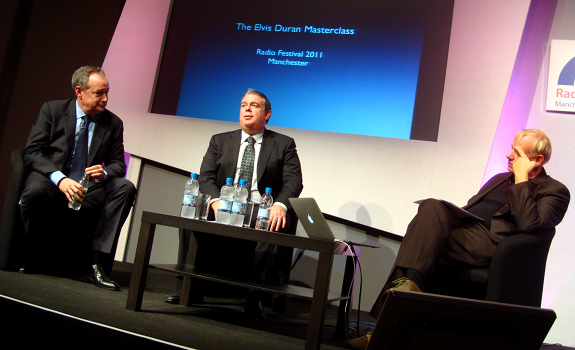
From left to right: Dennis Clark, Elvis Duran and Keith Pringle, who presented the session (photo: Thomas Giger)
Give interns creative space
He didn’t came to Manchester alone – he actually brought half of his morning show crew with him. The team broadcasts live from the UK this week, from studios in Manchester and London. Many crew members started out as interns. “They give us the best energy and the best ideas. TJ the DJ is our latest. He’s hilarious, off the wall; he’s the future of radio.” He also introduces Greg T, Carolina Bermudez, Danielle Monaro, Froggy, and executive producer Skeery Jones. “Without him, our show would not happen any day of the week. He’s a genius when it comes to reading my mind.”
“We’ll eat for dinner whatever is crawling across
the front yard. It’s the same in our show.”
Increase radio audience interaction
Morning radio has changed over the years. Song parodies and nonsense jokes are out, listener involvement is in. “Just doing gags and stunts and hi hi, we’re funny… who cares? People can get it anywhere and listen to something pre-recorded. We’re live! We have the ability to communicate with immediacy. If you don’t have a phone call on as much as you can, I think you’re making a mistake. And we were actually not that funny at all.”
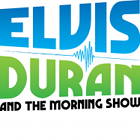 Elvis Duran aircheck montage
Elvis Duran aircheck montage
Here’s a portion of Elvis Duran And The Morning Show as it sounds today on Clear Channel‘s CHR flagship Z100. Besides New York, it’s also broadcast on over 40 other radio stations all over the US who are affiliates through content syndicator Premiere Radio Networks. An important part of the show is live audience interaction, and it seems that relationship issues are among the popular topics. It leads to radio like this:
[audio:http://www.radioiloveit.com/wp-content/uploads/elvis-duran-radio-personality-radio-festival-manchester-2011-recording-thomas-giger-1.mp3|titles=elvis-duran-radio-personality-radio-festival-manchester-2011-recording-thomas-giger-1]
Add listener life experience
Dennis Clark remembers how the show made a transition in the late 1990s. Many radio personalities still considered it to be funny to have a fake Dolly Parton, Arnold Schwarzenegger or Larry King call the show and make a joke. “Listeners absolutely told us: we’re sick of everything fake.” It was then decided to be more real, have a conversation, open the phone lines and invite listeners. “We called it ‘the fifth mic’, where the listeners were always stepping up to the microphone and making their life experience part of the show.”
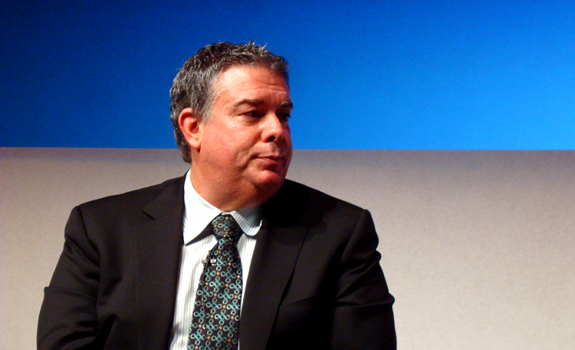
Elvis Duran: “If you’re not working with a support system, I don’t think it’s going to work” (photo: Thomas Giger)
Show your true personality
“You can’t be afraid to be yourself. Remember when you were a kid, when you had a friend sleep over and after the lights were off, you would talk about all the serious stuff in life? Be honest with your audience and let them know the real you. Listeners have bullshit detectors; they know if you’re being real. So you have to encourage yourself and your staff to just let it all out. You don’t have to be funny always. I cry on the air all the time, when something sad happens. I’m a big baby!”
“I know people who are number 1
who’s managers hold them down”
Go with the flow
Elvis says that during the show, the course can change completely based on something that happens. “Growing up in Texas, the saying was: we’ll eat for dinner whatever is crawling across the front yard. It’s the same in our show. We’ll stop in the middle of a sentence to move in a new direction. Someone may sneeze and I say: did you bring your sickness to work? And we’ll start an hour-long conversation about people who sneeze upon each other. You’ve got to be willing to take a turn anytime.”
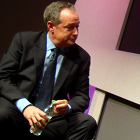 What makes great radio?
What makes great radio?
Elvis Duran thinks that you cannot reach creative hights without taking chances: “You have to have the guts to try”. Dennis Clark (photo) adds that a well-thought-out idea, based on real life, works well. It’s important to include several different opinions and an open end, to trigger listener response. Then the conversation turns into a hilarious discussion about what you can and cannot say on the radio… check this out:
[audio:http://www.radioiloveit.com/wp-content/uploads/elvis-duran-radio-personality-radio-festival-manchester-2011-recording-thomas-giger-2.mp3|titles=elvis-duran-radio-personality-radio-festival-manchester-2011-recording-thomas-giger-2]
Secure management & consultant backup
Based on a question from a Rock station jock that sat next to me in the audience, Elvis makes clear how important it is that station managers backup their talent. “If you have a manager who’s not believing in you; who doesn’t allow you to do what you need to do, maybe that place isn’t for you. Or find an ally to come in and work with you.” For Duran, it was Dennis Clark who helped him to further develop the show. “If you’re not working with a support system, including your management, I don’t think it’s going to work. I know people who are number 1 who’s managers hold them down and hate them even then. You don’t want to work there.”
 What are the lessons you’ve learned from PPM research? (my question)
What are the lessons you’ve learned from PPM research? (my question)
“Portable People Meter has taught us that it’s about taking a break at the proper time on the clock, otherwise we won’t get credit for our quarter hour”, Elvis explains. “It’s not only important to keep people for a long period of time, it’s also important to have them coming back. So say: come back tomorrow at the same time – we’re going to do this and this. These occasions of listening help your PPM numbers.”
Analyze listener attention span
Dennis Clark loves that PPM ratings reveal the listener’s attention span. “Some people say: oh my God, your breaks are too long! But then we go back to minute by minute PPM reporting and see: no, we actually grew an audience then – it was this next event that turned them off. Even when you think you’re playing their favorite song, they’ll switch off. It’s about blending all content into one thing to keep them listening.” Research shows: the average listener tunes into his favorite station 10-15 times (“instances”) a day.
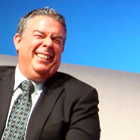 Learn from listener feedback
Learn from listener feedback
Elvis Duran is a creative, but he also sees the importance of research. “Have you ever been on a focus group and watch them rip the living hell out of you? I have – and it’s okay. I know, I’m not everyone’s cup of tea. But to be able to sit on a focus group is a luxury. It’s so expensive.” He once went to a focus group with Elliot Segal, his morning show co-host back then. It was an experience he won’t forget! What happened was this:
[audio:http://www.radioiloveit.com/wp-content/uploads/elvis-duran-morning-show-radio-personality-z100-radio-festival-manchester-2011-recording-thomas-giger-3.mp3|titles=elvis-duran-morning-show-radio-personality-z100-radio-festival-manchester-2011-recording-thomas-giger-3]
Read also:
- Elvis Duran: “Radio Feels Like Sitting In An Electric Chair”
- Elvis Duran: American Radio’s Jerry Seinfeld
- Interview Elvis Duran: “I’m Just Into My Own Thing”
Stay tuned, follow us: @RadioILOVEIT





Add Your Comment